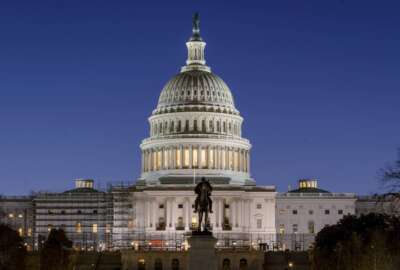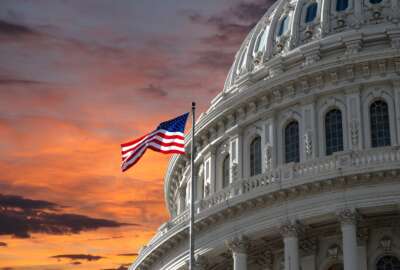
A lot’s been happening while Congress is on recess, focusing on the mid-terms
Congress has lots to work on when it comes back from recess after the election next week.
Best listening experience is on Chrome, Firefox or Safari. Subscribe to Federal Drive’s daily audio interviews on Apple Podcasts or PodcastOne.
Congress continues on its recess as House members and a third of the Senate focus on midterm elections. But there’s plenty going on, including that yearly bugaboo, the debt limit. The Federal Drive with Tom Temin, gets more now from Bloomberg Government Deputy News Director Loren Duggan.
Interview transcript:
Tom Temin: And the debt limit question seems to be coming up, Janet Yellen is being pulled into debates about all of this wider discussion, since it seems like they just settled it a few weeks ago.
Loren Duggan: That limit was taken care of already during this Congress. But the issue is that it’s going to rear its head again, in sometime around the third quarter of next year is the estimate, unlike before, where they had suspended it for dates, this one is based on the dollar amount. And so whenever that dollar amount gets approached for how much debt you can have, that’s where some issues will come up. The issue here is related to what you talked about the midterm elections that are coming up, and what some people are seeing as the likelihood that Republicans take over one or both chambers of Congress. When that’s happened in the past, there’s been a little bit more of a standoff over the debt limit, with Republicans looking to a Democratic president and trying to extract some fiscal policy changes. Now that is leading to some political discussion on the trail with what exactly would those be? What would you cut? What would the pressures be? But that’s leading, at least I think, some discussion or thinking at least, about whether or not you do the debt limit sooner rather than later so that it’s not hanging out over their head. But at the moment, nothing has been scheduled. And you know, there’s no real pressure to do something. Until next year, at this rate.
Tom Temin: Yes, the President was touting the fact that the deficits had dropped in the last fiscal year to only $1.4 trillion. But if you read the projections of the Congressional Budget Office, they’re gonna go right back up again. And so this question could come even a little sooner than that, depending on the fiscal trends.
Loren Duggan: Right. And that’s why it’s an estimated date, right? You have to you have to kind of see what’s coming in and going out and what may change even with some legislation passed in the lame duck session, because we do expect a lot of things to move there. Whether that moves the needle directly or not, we’ll have to see, but this is going to be a big question: what to do? And when you do have divided government, a lot of times the budget is where some of these things really happen, because you do have action forcing deadlines, like the debt limit, and like the September 30 expiration of funding next year, where that gives people leverage to maybe have these kinds of discussions and debates, as we saw back in 2011, when then Speaker Boehner and then President Obama tried to work something out. And that also led to the Budget Control Act and sequestration and all the things that loomed over the government for quite a while there, as well as the spending caps that followed. So, you know, a lot can happen as a result of this debate and this negotiation process.
Tom Temin: And the meantime, there is money to be spent on infrastructure. And so therefore, the White House Permit Office has been bulking up. This is something Bloomberg has been reporting on, Congress did recess without any action on the idea of federal permitting, changing statutorily that Joe Manchin had maybe hoped for giving his assent to some other spending. So what does it mean that the White House Permit Office is bulking up?
Loren Duggan: Well, we’ve had, you know, a couple of big laws in the infrastructure space. Obviously, in 2021, we had the bipartisan infrastructure law that reauthorized highway programs, and also had a lot of funding for other types of infrastructure. And then the health care tax and climate change package that was passed in August and signed into law did increase the amount of money available to this federal permitting council, I think it went from $10 million to $350 million, so pretty big increase in its budget. And so they’re working through how to dole out that money, how to use that money effectively to try and help people out. That’s something that Stephen Lee in our environment team did write about. And so to me, you know, that’s, that’s an example of one of these laws getting passed and getting a lot of funding to work. Obviously, another agency that got a big funding boost in that same law was the IRS, which is still working through all the money that it got for enforcement activities, modernization. That’s been something that’s come up a lot on the campaign trail, and probably would be revisited by Republicans should they take over. So we are seeing the effects of this money flowing through the federal coffers with the the bulking up in the staffing and everything.
Tom Temin: All right, we’re speaking with Loren Duggan, deputy news director of Bloomberg Government. CISA, the Cybersecurity and Infrastructure Security Agency, as you’ve reported, as Federal News Network has reported, came out with its guidelines or performance goals they call them, for industry. There’s not a lot of new ground here and what they’re asking industry to do, but it’s seems to be maybe leading up to either statutory or regulatory action. What has Bloomberg found about this?
Loren Duggan: Yeah, I mean, we are digesting the guidance that came out yesterday, obviously, and our reporters, a couple of them worked to talk to different industry groups and see how they were feeling. A lot of these rules or this in particular was rewritten based on some of the industry feedback before, but that’s one of the things that can be successful when government and the private sector worked together on this. But infrastructure and cybersecurity issues have been at the forefront of Congress. We saw some action earlier this year, on I think it was this year, on some cybersecurity changes. And there’s other things that they may work on and a FedRAMP authorization is still looming, there’s been some bills passed in both chambers, but no final resolution on that. So I would expect more action on cybersecurity. That’s an area where there can be bipartisanship, we talk a lot about usually the more partisan issues here. But certainly, you know, committees even like the Oversight and Reform Committee, or Government Affairs Committee over in the Senate, will be looking at this and trying to do more in the cybersecurity space, both at the government level and all the systems there, but then as it interacts with the private sector, so I would expect more oversight of what’s already come and had maybe some tweaks in legislation to come.
Tom Temin: And while we have you, just review for us the rest of the time that is there for the recess, and the lame duck, what does that schedule look like? And what can we expect in Congress again?
Loren Duggan: I would expect a busy lame duck session, especially if the Republicans take over one of the chambers, the Democrats with the keys to all three the House, the Senate, and the White House will try to get through what they can before the end of the year, two big projects, one is omnibus spending, or something to do with government funding before the December 16 expiration of the continuing resolution. The second is the National Defense Authorization Act, which is a must pass bill for more than six decades they’ve been doing it, they’re not going to stop now. And both of those bills would become attractive vehicles for other things they want to do whether it’s same sex marriage or changes to to other laws that they’ve talked about some partisan, some bipartisan, maybe we’ll see the debt limit rear its head in these discussions as well. But between November 14, which is the Monday after the election, and January 3 When the Congress has to end, I would expect a lot of activity, hopefully not right up until Christmas Eve and Christmas Day, but there’s a lot to do and I wouldn’t rule that out given all they have to do.
Tom Temin: Loren Duggan is deputy news director of Bloomberg Government.
Copyright © 2025 Federal News Network. All rights reserved. This website is not intended for users located within the European Economic Area.
Tom Temin is host of the Federal Drive and has been providing insight on federal technology and management issues for more than 30 years.
Follow @tteminWFED




